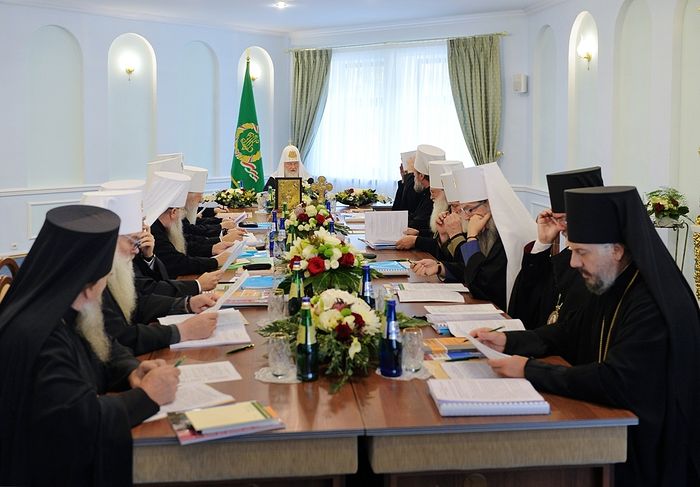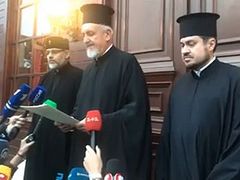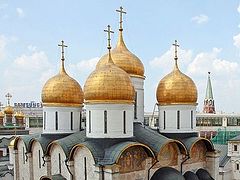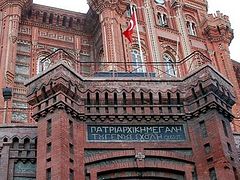Statement adopted at the meeting of the Holy Synod of the Russian Orthodox Church on October 15, 2018 in Minsk
With deepest pain, the Holy Synod of the Russian Orthodox Church received the message of the Patriarchate of Constantinople published on October 11, 2018 about the decisions adopted by the Holy Synod of the Patriarchate of Constantinople: on the confirmation of the intention to “grant autocephaly to the Ukrainian Church”; on the opening of the “stavropegion” of the Patriarch of Constantinople in Kiev; on the “restoration in the hierarchal or priestly rank” of the leaders of the Ukrainian schism and their followers and the “return of their faithful to Church communion”; and on the “cancellation of the action” of the conciliar charter of the Patriarchate of Constantinople in 1686 concerning the transfer of the Kiev Metropolia to the Moscow Patriarchate
The Synod of the Church of Constantinople made these decisions unilaterally, ignoring the calls of the Ukrainian Orthodox Church and the entirety of the Russian Orthodox Church, as well as the fraternal Local Orthodox Churches, and their primates and bishops for pan-Orthodox discussion of the issue.
Entering into communion with those who have departed into schism, let alone those who have been excommunicated from the Church, is tantamount to departing into schism and is severely condemned by the canons of the holy Church: “If any one of the bishops, presbyters, or deacons, or any of the clergy shall be found communicating with excommunicated persons, let him also be excommunicated, as one who brings confusion on the order of the Church” (Canon 2 of the Council of Antioch; Canon 10, 11 of the Holy Apostles).
The decision of the Patriarchate of Constantinople on the “restoration” of the canonical status and the reception into communion of the former Metropolitan Philaret Denisenko, excommunicated from the Church, ignores a number of successive decisions of the Bishops' Councils of the Russian Orthodox Church, the legitimacy of which are beyond doubt.
By the decision of the Bishops’ Council of the Ukrainian Orthodox Church in Kharkov of May 27, 1992, Metropolitan Philaret (Denisenko) was removed from the Kiev Cathedra and was banned from the clergy for not fulfilling the oath made by him before the cross and the Gospel at the previous Bishops' Council of the Russian Orthodox Church.
By its ruling of June 11, 1992, the Bishops’ Council of the Russian Orthodox Church, confirmed the decision of the Kharkov Council and expelled Philaret Denisenko from his rank, depriving him of every degree of the priesthood on the following charges: “Cruel and arrogant attitude to the subordinate clergy, dictatorialness, and intimidation (Tit. 1:7-8; Canon 27 of the Holy Apostles); introducing temptation among the faithful by his behavior and personal life (Matthew 18:7; Canon 3 of the First Ecumenical Council, Canon 5 of the Sixth Ecumenical Council); oath-breaking (Canon 25 of the Holy Apostles); public slander and blasphemy against the Bishops’ Council (Canon 6 of the Second Ecumenical Council); the celebration of clerical functions, including ordinations, in a state of suspension (Canon 28 of the Holy Apostles); the perpetration of a schism in the Church (Canon 15 of the First-Second Council).” All ordinations performed by Philaret in a suspended state since May 27, 1992, and the punishments imposed by him, were declared invalid.
Despite repeated calls for repentance, after the deprivation of his hierarchal rank Philaret Denisenko continued his schismatic activity, including within the bounds of other Local Churches. By the ruling of the Bishops’ Council of the Russian Orthodox Church of 1997, he was given over to anathema.
The aforesaid decisions were recognized by all the Local Orthodox Churches, including the Church of Constantinople. In particular, His Holiness Patriarch Bartholomew of Constantinople wrote on August 26, 1992, in response to the letter of His Holiness Patriarch of Moscow and All Russia Alexei II concerning the deposition of the Metropolitan of Kiev Philaret: “Our Holy Great Church of Christ, recognizing the fullness of the Russian Orthodox Church’s exclusive competence on this issue, synodally accepts the decision on the aforementioned.”
The letter of His Holiness Patriarch Bartholomew to His Holiness Patriarch Alexei II dated April 7, 1997, on the anathematization of Philaret Denisenko states: “Having received notification of the mentioned decision, we informed the hierarchy of our Ecumenical Throne of it and implored them to henceforth have no ecclesial communion with the persons mentioned.”
Now, after more than two decades, the Patriarchate of Constantinople has changed its position for political reasons.
In its decision to justify the leaders of the schism and “legitimize” their hierarchy, the Holy Synod of the Church of Constantinople refers to the non-existent “canonical privileges of the Patriarch of Constantinople to accept the appeals of bishops and clerics from all autocephalous Churches.” These claims, in the form in which they are now being carried out by the Patriarch of Constantinople, have never had the support of the fullness of the Orthodox Church: They have no grounds in the sacred canons and directly contradict, in particular, Canon 15 of the Council of Antioch: “If any bishop … is tried by all the bishops in the province, and all of them have pronounced one decision against him in complete agreement with each other, let him no more be tried again by others, but let the concordant verdict of the bishops of the province stand on record”—they are also refuted by the practice of the decisions of the holy Ecumenical and Local Councils and the interpretations of authoritative canonists of the Byzantine and modern times.
Thus, John Zonaras writes: “Constantinople [the Patriarch] is recognized as a judge not generally over all metropolitans, but only over those subordinate to him. For neither the metropolitans of Syria, nor the Palestinians, nor the Phoenicians, nor the Egyptians are brought against his will to his court, but the Syrians are subject to the judgment of the Patriarch of Antioch, the Palestinians to the Patriarch of Jerusalem, and the Egyptians are judged by the Alexandrian Patriarch by whom they are ordained and to whom they are subordinated.”
Canon 116 (118) of the Council of Carthage speaks about the impossibility of accepting into communion someone convicted in another Local Church: “Whoever, having been excommunicated from Church communion … sneaks into overseas countries in order to be accepted into communion, he shall endure ejection from the clergy.” The same is spoken of in the Councils’ canonical message to Pope Celestine: “So let not persons excluded from communion in their own province appear to be restored to communion earnestly and unduly by Your Holiness… Any matters whatsoever that might arise ought to be settled within their own territories.”
St. Nikodemos of the Holy Mountain, in his Pedalion, which is an authoritative source of ecclesiastical-canonical law of the Church of Constantinople, interprets Canon 9 of the Fourth Ecumenical Council, rejecting the false opinion on the right of Constantinople to consider appeals from other Churches: “The Primate of Constantinople does not have the right to act in the dioceses and provinces of other Patriarchs, and this rule did not give him the right to take appeals on any matter in the Ecumenical Church... “ Listing a whole range of arguments in favor of this interpretation, referring to the practice of the decisions of the Ecumenical Councils, St. Nikodemos concludes: “At present ... the Primate of Constantinople is the first, the only, and the last judge over the metropolitans subordinate to him—but not over those who are subject to the rest of the Patriarchs. For, as we said, the last and universal judge of all the Patriarchs is the Ecumenical Council and no one else.” It follows from the above that the Synod of the Church of Constantinople does not have canonical rights to withdraw judicial decisions rendered by the Bishops’ Council of the Russian Orthodox Church.
The appropriation of the authority to cancel judicial and other decisions of other Local Orthodox Churches is only one of the manifestations of the new false doctrine now proclaimed by the Church of Constantinople attributing to the Patriarch of Constantinople the rights of the “first without equal” (primus sine paribus) with universal jurisdiction. “Such a vision by the Patriarchate of Constantinople of its own rights and powers enters into an insurmountable contradiction with the centuries-old canonical tradition upon which the existence of the Russian Orthodox Church and other Local Churches is based,” warned the Bishops’ Council of the Russian Orthodox Church of 2008 in the definition “On the Unity of the Church.” In the same definition, the Council called on the Church of Constantinople “from henceforth, pending a pan-Orthodox examination of the listed innovations, to exercise caution and refrain from steps that could detonate Orthodox unity. This particularly applies to attempts to revise the canonical bounds of the Local Orthodox Churches.”
The Act of 1686, confirming the existence of the Kiev Metropolia as part of the Moscow Patriarchate and signed by His Holiness Patriarch Dionysius IV of Constantinople and the Holy Synod of the Church of Constantinople, is not subject to review. The decision to “revoke” it is canonically insignificant. Otherwise, it would be possible to annul any document defining the canonical territory and status of a Local Church, regardless of its antiquity, authority, and Church-wide recognition.
In the Synodal charter of 1686 and the other documents accompanying it, nothing is said either about the temporary nature of the transfer of the Kiev Metropolia to the jurisdiction of the Moscow Patriarchate, or that this act can be canceled. The attempt of the hierarchs of the Patriarchate of Constantinople to reconsider this resolution in political and self-seeking ways more than three hundred years after it was issued contradicts the spirit of the sacred canons of the Orthodox Church, which do not allow the possibility of revising established and long-undisputed Church borders. Thus, Canon 129 (133) of the Council of Carthage reads: “If anyone … causes any region to revert to the catholic unity and holds possession thereof for a space of three years without anyone seeking to take it away from him, henceforth it shall not be taken away from him, if, moreover, within the said space of three years there was a bishop who was entitled to it but remained silent.” And Canon 17 of the Fourth Ecumenical Council establishes a thirty-year statute of limitations for the possible conciliar consideration of disputes regarding the ownership of even individual parishes: “The parishes in each diocese ... must invariably remain under the authority of the bishops who manage them—and especially if over the course of thirty years they indisputably had them under their authority and administration.”
And how is it possible to cancel a decision that has been in force for three centuries? It would signify an attempt to read the entire subsequent history of the development of Church life “as though it never were.” The Patriarchate of Constantinople does not seem to notice that the Kiev Metropolia of 1686, the return of which to its structure is now declared, had boundaries differing significantly from the modern borders of the Ukrainian Orthodox Church, covering only a smaller part of the latter. The Kiev Metropolia of our day as such includes the city of Kiev and some districts adjacent to it. The largest part of the dioceses of the Ukrainian Orthodox Church, especially in the east and south of the country, was founded and developed as part of the autocephalous Russian Church, being the fruit of its centuries-old missionary and pastoral activities. The current act of the Patriarchate of Constantinople is an attempt to steal something that never belonged to it.
The act of 1686 put an end to the two-hundred-year period of forced division in the centuries-old history of the Russian Church, which, despite changing political circumstances, invariably recognized itself as a single entity. Following the reunification of the Russian Church in 1686, for more than three centuries, no one doubted that the Orthodox of Ukraine were the flock of the Russian Church, and not the Patriarchate of Constantinople. And today, the pressure of external anti-Church forces notwithstanding, this multi-million flock values the unity of the Church of All Russia and remains faithful to it.
The attempt of the Patriarchate of Constantinople to decide the fate of the Ukrainian Orthodox Church without its consent is an anticanonical encroachment on foreign Church provinces. One Church canon reads: “May the same rule be observed in other provinces and in dioceses everywhere, that none of the bishops most beloved by God would extend his power to another’s diocese … and let the Canons of the Fathers be not transgressed, nor the arrogance of secular authority creep in under the pretext of Divine services; lest imperceptibly and little by little we lose the freedom which our Lord Jesus Christ, the Liberator of all men, has given us as a free gift by His own blood (Canon 8 of the Third Ecumenical Council). The decision of the Patriarchate of Constantinople to establish, by agreement with the secular authorities, its “stavropegion” in Kiev without the knowledge and consent of the canonical hierarchy of the Ukrainian Orthodox Church falls under the condemnation of this canon.
Hypocritically justifying the desire to restore the unity of Ukrainian Orthodoxy, by its reckless and politically motivated decisions the Patriarchate of Constantinople introduces even greater division and aggravates the suffering of the canonical Orthodox Church of Ukraine.
The reception of schismatics and one anathematized in another Local Church with all the “bishops” and “clerics” ordained by them into communion, the encroachment on foreign canonical provinces, the attempt to renounce their own historical decisions and commitments—all of this leads the Patriarchate of Constantinople beyond the bounds of the canonical field and, to our great sorrow, makes it impossible for us to continue Eucharistic communion with its hierarchs, clergy, and laity. Henceforth, and until the Patriarchate of Constantinople renounces the anti-canonical decisions made by it, it is impossible for all clergy of the Russian Orthodox Church to concelebrate with clerics of the Church of Constantinople, and for laity—to participate in the Sacraments celebrated in its churches.
The transfer of hierarchs or clergy from the canonical Church to schismatics or entering into Eucharistic communion with the latter is a canonical crime and entails the appropriate sanctions.
With regret we recall the prediction of our Lord Jesus Christ about times of temptation and the particular suffering of Christians: And because iniquity shall abound, the love of many shall wax cold (Mt. 24:12). In the conditions of such a deep undermining of the foundations of inter-Orthodox relations and the total disregard for the thousand-year norms of ecclesial-canonical law, the Holy Synod of the Russian Orthodox Church considers it its duty to defend the fundamental pillars of Orthodoxy, and to defend the Holy Tradition of the Church, which is being replaced by new and alien teachings about the universal authority of the first of the Primates.
We call upon the Primates and Holy Synods of the Local Orthodox Churches to properly evaluate the aforementioned anticanonical acts of the Patriarchate of Constantinople and to jointly search for ways out of this gravest of crises that is rending the body of the One, Holy, Catholic, and Apostolic Church.
We express our full support for His Beatitude Metropolitan Onuphry of Kiev and All Ukraine and the entirety of the Ukrainian Orthodox Church in this particularly difficult time for it. We pray for the strengthening of its faithful children to courageously stand for truth and the unity of the canonical Church in Ukraine.
We entreat the archpastors, clergy, monastics, and laity of the entire Russian Orthodox Church to strengthen their prayers for their brothers and sisters of one faith in Ukraine. May the prayerful protection of the Most Holy Queen of Heaven, the venerable fathers of Kiev Caves Lavra, St. Job of Pochaev, the New Martyrs, Confessors, and all the saints of the Russian Church be upon us all.





Statement on the situation in Ukraine.
No one can say that the russian church
Did not try it's best to avoid the schism.
I really appreciate this site which has
Produced the best news and information
About the Ukrainian situation.